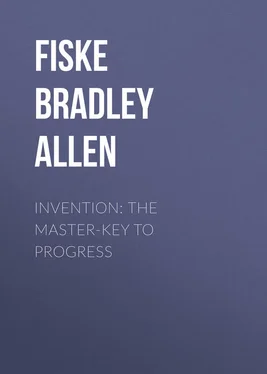Bradley Fiske - Invention - The Master-key to Progress
Здесь есть возможность читать онлайн «Bradley Fiske - Invention - The Master-key to Progress» — ознакомительный отрывок электронной книги совершенно бесплатно, а после прочтения отрывка купить полную версию. В некоторых случаях можно слушать аудио, скачать через торрент в формате fb2 и присутствует краткое содержание. Жанр: foreign_antique, foreign_prose, на английском языке. Описание произведения, (предисловие) а так же отзывы посетителей доступны на портале библиотеки ЛибКат.
- Название:Invention: The Master-key to Progress
- Автор:
- Жанр:
- Год:неизвестен
- ISBN:нет данных
- Рейтинг книги:4 / 5. Голосов: 1
-
Избранное:Добавить в избранное
- Отзывы:
-
Ваша оценка:
- 80
- 1
- 2
- 3
- 4
- 5
Invention: The Master-key to Progress: краткое содержание, описание и аннотация
Предлагаем к чтению аннотацию, описание, краткое содержание или предисловие (зависит от того, что написал сам автор книги «Invention: The Master-key to Progress»). Если вы не нашли необходимую информацию о книге — напишите в комментариях, мы постараемся отыскать её.
Invention: The Master-key to Progress — читать онлайн ознакомительный отрывок
Ниже представлен текст книги, разбитый по страницам. Система сохранения места последней прочитанной страницы, позволяет с удобством читать онлайн бесплатно книгу «Invention: The Master-key to Progress», без необходимости каждый раз заново искать на чём Вы остановились. Поставьте закладку, и сможете в любой момент перейти на страницу, на которой закончили чтение.
Интервал:
Закладка:
To us who have been carefully taught the facts known at the present day, and whose minds have been trained by logic and mathematics to reason from effect to cause, and to construct frameworks of cause wherefrom to gain effects, it seems that anyone who noted that the hard substance which we call iron came from heating certain stones, would immediately invent a process for making iron in quantities. But prehistoric man had no knowledge whatever save that coming from his own observation and the oral teachings of the wise men; mathematics and logic did not exist; and the only training given him was in those simple arts of hunting, fishing, field tilling, etc., by which he earned his livelihood. For a mind so untrained and ignorant to leap from the simple noting of the accidental production of the metal to a realization of its value, then to a correct inference as to the possibility of producing it at will, then to a correct inference as to the method of producing it, and then to devising the method and actually producing iron at will, suggests a reasoning intelligence of an order exceedingly high.
Nevertheless, the art of making iron may have originated not so much from effort as from inspiration; the process may have been less one of reasoning than one of imagination, less one of construction than one of invention. In fact, when we realize that imagination is almost wholly a pure gift (like beauty, or artistic genius or a singing voice) while the reasoning and constructive faculties require long education, we may reasonably conclude that the production of iron and of all the metals and processes in prehistoric times, was probably attributable mainly to invention.
The crowning invention of prehistoric man was that of writing; for it lifted him out of his dependence on oral teachings, with their liability to error and forgetfulness, into a condition in which the facts and experiences of life, and the reasons for failure or success, could be put into permanent form, and supply sure bases from which to start on any line of progress in the future.
The production of the art of writing seems to have been a pure invention, and it has always been so regarded. Nothing resembling writing is to be found in nature; nowhere do we see in nature any effort to preserve any records of any kind . How man, or a man, was led to invent writing we can only imagine, for we cannot ascertain. When we realize, however, how entirely novel an undertaking the production of writing was, and that there is no process of mere reasoning by which a man could arrive at a decision to produce it, we seem forced to conclude that it must have been caused by one of those inexplicable conceptions that imagination puts into the mind, and that constitute an inspiration, coming from the Great Outside and its ruler, the Almighty.
In fact, if one ponders the history and teachings of the Christian religion (in truth of all religions), and notes that the revelations on which they are believed to have been founded seem to have come unbidden to certain men as inspirations from On High, he must realize how similar are the conceptions that come to inventors in a field less spiritual, but yet actual. For in the case of each basic invention, an idea seems to have come unbidden to the mind, and grown and developed there.
The first writing was what we call picture writing, in which representations in outline of well-known objects were scratched with a hard point on some softer substance. This form of writing probably began in the Old Stone Age. It continued for different lengths of time among different peoples, as have all other characteristics of any stage of civilization; and it is practiced in some degree by some peoples even now. In fact, one might with reasonableness declare that many of the illustrations used in books and magazines and papers, many of the paintings and drawings that adorn our walls, and many of the moving pictures in our places of amusement convey messages by means of pictures, and are therefore forms of picture writing.
As the intelligence of man increased, and his consequent need for better means of expressing himself in writing increased, the idea occurred to someone to use conventional drawings to represent vocal sounds, instead of pictures of visible objects. The first writing of this kind, called phonetic writing, used characters that represented spoken words, and therefore required many characters and necessitated long and tedious study to master it. It was gradually replaced among most peoples by an improved phonetic system, in which each character represented a syllable instead of a word; though the Chinese have never wholly abandoned it. The syllabic system needed, of course, fewer characters, and was much more easily learned, much more flexible and generally satisfactory. The syllabic system was finally replaced among the more progressive peoples by the alphabetical system, in which each character represents a separate vocal sound. As the number of separate vocal sounds is few, only a few characters are needed. In most alphabets, the number of characters varies between twenty-two and thirty-six.
We of the present day plume ourselves greatly on our achievements in invention, and point to the tens of thousands of scientific appliances, books and works of art with which we have enriched our civilization. To most of us, prehistoric man was an uncouth creature, living in caves and uncleanly huts, and so far removed from us that in our hearts we class him as little higher than the beasts. Yet to prehistoric man we owe all that we are and all that we have. The gift of life itself came to us through him; and so did not only our physical faculties, but our mental, moral and spiritual faculties as well. It was prehistoric man who invented the appliances without which the wild beasts would not have been overcome, and the man, wilder than himself, been kept at bay; by means of which the soil was tilled, and boats were made to move upon the water, and villages and towns were built. It was prehistoric man who invented spoken language and the arts of drawing, painting, architecture, weaving and writing. It was prehistoric man who started the race on its forward march, and pointed it in the direction in which it has ever since advanced. It was prehistoric man who made the inventions on which all succeeding inventions have been based. The prehistoric inventor exercised an influence on progress greater than that of any other man.
CHAPTER II
INVENTION IN THE ORIENT
The first countries to pass into the stage of recorded history were Egypt and Babylonia. Excavations made near the sites of their ancient cities have brought to light many inscriptions which, being deciphered and translated, give us clear knowledge of the conditions under which they lived, and therefore of the degree of the civilization that they had attained.
As we note the progress that the inscriptions show us to have been made beyond the stage reached by prehistoric man, it becomes clear to us that much – if not most – of that progress could not have been made without the aid of writing. One cannot conceive of the invention and development of Astronomy, for instance, without some means of recording observations that had been made.
In developing the art of writing itself, much progress was effected in both countries, and many improvements were made in the art itself that must have been due to that lower order of invention which consists in improving on things already existing. In addition, invention was employed in devising and arranging means for preserving the writings in an enduring form. In Babylonia, this was done by making the writing on soft tablets of clay about an inch in thickness, that were afterwards baked to hardness. In the case of records of unusual importance, the precaution was sometimes taken of covering the baked inscription with a thin layer of clay, making a duplicate inscription on this layer, and then baking it also. If afterwards, from any cause, the outside inscription was defaced, it could be removed and the inside inscription exposed to view.
Читать дальшеИнтервал:
Закладка:
Похожие книги на «Invention: The Master-key to Progress»
Представляем Вашему вниманию похожие книги на «Invention: The Master-key to Progress» списком для выбора. Мы отобрали схожую по названию и смыслу литературу в надежде предоставить читателям больше вариантов отыскать новые, интересные, ещё непрочитанные произведения.
Обсуждение, отзывы о книге «Invention: The Master-key to Progress» и просто собственные мнения читателей. Оставьте ваши комментарии, напишите, что Вы думаете о произведении, его смысле или главных героях. Укажите что конкретно понравилось, а что нет, и почему Вы так считаете.












